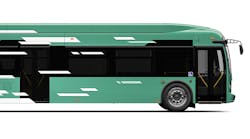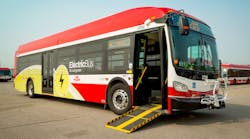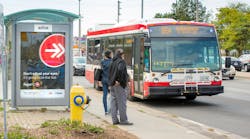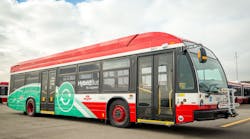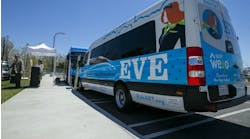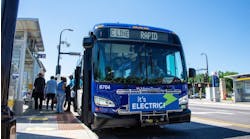The Toronto Transit Commission (TTC) is receiving the first of 336 additional hybrid-electric buses as part of its transition to a completely zero-emissions fleet. The buses began arriving in April and will enter service in May after undergoing inspection and testing. This process will continue through early 2024.
All of the hybrid-electric buses will replace existing buses that have reached the end of their useful life, including 68 60-foot hybrid-electric buses, which will replace older 40-foot buses, adding significant capacity to the fleet and reducing travel times. These buses will be based out of the TTC’s Mount Dennis and Wilson divisions and will serve routes in midtown, downtown, North York and Etobicoke.
“Hybrid-electric buses offer residents and visitors a clean, quiet and healthy alternative to travel around our city,” said Toronto Deputy Mayor Jennifer McKelvie. “These new buses demonstrate the city of Toronto’s continued efforts to reduce our cumulative carbon footprint, shape a sustainable city and achieve our goal of net zero emissions by 2040.”
The TTC Green Bus Technology Plan, approved by the Board in Nov. 2017, includes the procurement of low-emissions hybrid-electric buses ending in 2024 and only zero-emissions buses starting in 2025. The target is to have an entirely zero-emissions fleet by 2040. This is a critical step in the city of Toronto’s TransformTO Net Zero Strategy and is aligned with international commitments through the Fossil-Fuel-Free Streets Declaration.
“We are pleased to be moving forward with our sustainability goals while also providing a better transit experience for our customers,” said TTC Chair Jon Burnside. “The arrival of additional hybrid buses means fewer greenhouse gas emissions, improved air quality and newer vehicles for our customers and employees.”
“The TTC is committed to being completely zero-emissions by 2040 or sooner,” said TTC CEO Rick Leary. “As electric bus technology is still developing, we’ve purchased hybrid-electric buses, which are a proven transition technology. With the addition of these new, modern vehicles to our fleet, we are well on our way to achieving our goals while continuing to focus on delivering reliable service.”
Today’s hybrid bus is as close as possible to being a fully battery-electric bus (eBus) as it is driven by an electric motor powered by an onboard battery system. The only distinction between a hybrid and an eBus is the hybrid has an onboard generator that produces electricity when needed. The benefits of the hybrid-electric fleet are estimated as follows:
- Reduces greenhouse emissions by 12,000 tons annually
- Reduces diesel cost by C$6,864 (US$5,091) annually
- Eliminates idling in traffic and at bus stops using engine stop/start technology
Enables upskilling for operators and maintenance employees through an all-electric propulsion system and all-electric accessories, including doors, HVAC, power steering and air compressor systems.
In Feb. 2022, the TTC awarded contracts for 336 hybrid-electric buses to be delivered in 2023 and 2024 as follows:
- Nova Bus: 134 40-foot hybrid-electric buses
- New Flyer Industries: 134 40-foot hybrid-electric buses
- New Flyer Industries: 68 60-foot hybrid-electric buses
With this procurement, one third of the TTC’s bus fleet will be made up of low or zero-emissions buses by mid-2024. This is the final hybrid-electric bus procurement before the TTC transitions to eBus-only vehicle purchases moving forward.
